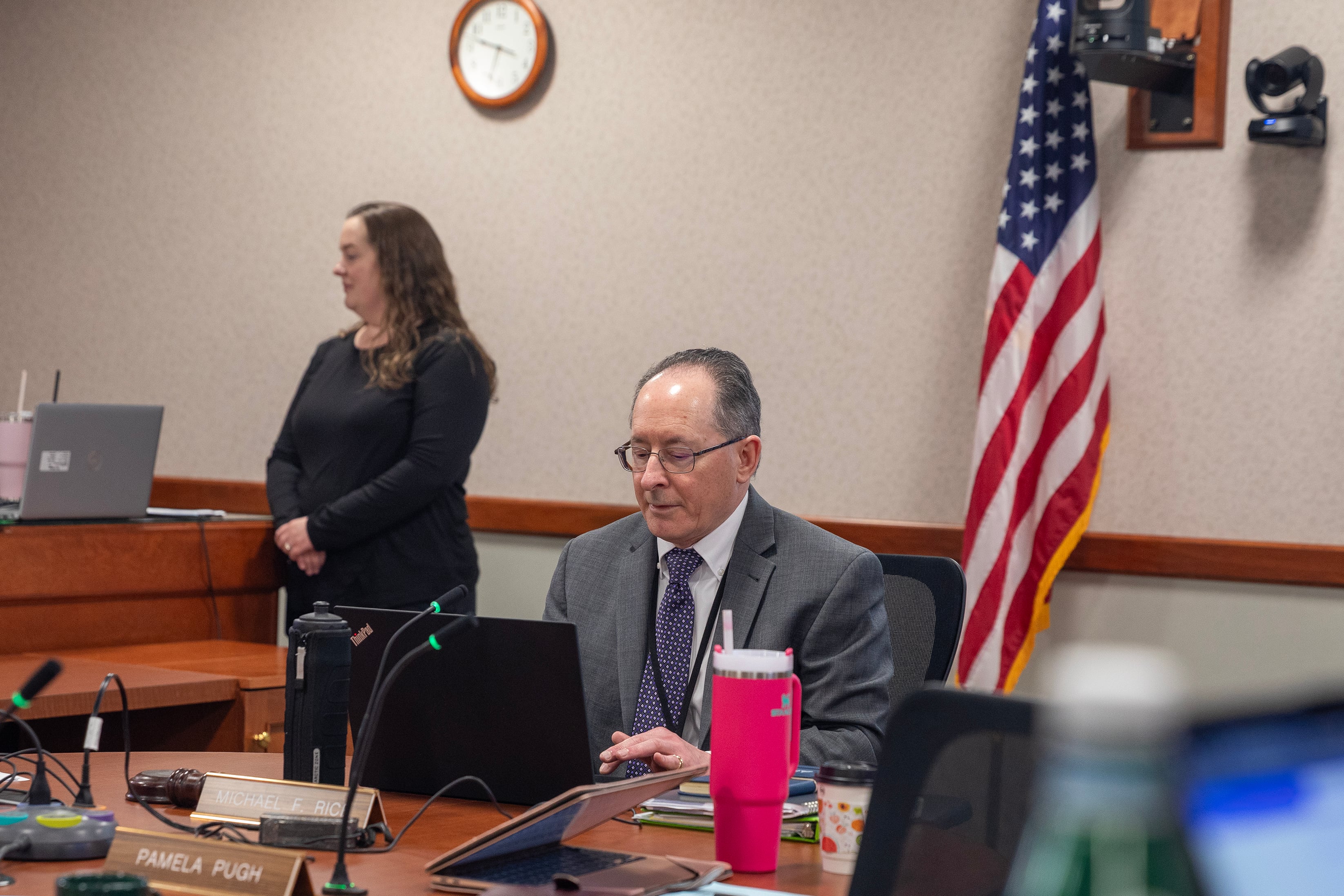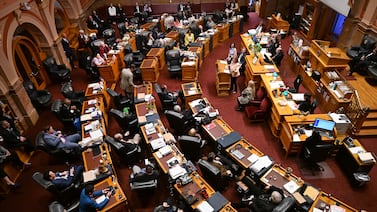Sign up for Chalkbeat Detroit’s free newsletter to keep up with the city’s public school system and Michigan education policy.
Michigan schools’ efforts to incorporate curriculum that reflects its diverse student body won’t be changed by President Donald Trump’s executive order attempting to ban schools from teaching “discriminatory equity ideology” and “gender ideology,” the state superintendent of public instruction says.
In an interview Thursday with Chalkbeat, Michael Rice said the Michigan Department of Education believes in teaching comprehensive history and literature, including lessons around race, racism, sexism, and xenophobia.
“We think that there’s power in the whole,” he said. “We think that there’s richness in the whole – that we should be teaching not just the soaring moments of U.S. history, but the searing moments of U.S. history.”
On Thursday, Rice also sent out a memo to local superintendents in response to the executive order emphasizing that educators have a moral and professional responsibility to protect and support LGBTQ+ students. The letter cited legal obligations under the state’s Elliot-Larsen Civil Rights Act, which prohibits discrimination based on sexual orientation and gender identity.
“Neither a presidential executive order nor federal regulations, whether related to federal funding or not, can supersede or otherwise set aside our obligation to comply with a validly enacted state anti-discrimination law,” the memo read.
On Jan. 29, Trump issued an executive order that sought to withhold federal funding from public K-12 schools that teach “discriminatory equity ideology” or “gender ideology.”
Experts say it will likely take months for the full impact of the executive order to be known and it will likely face legal challenges.
The executive order said anything “that treats individuals as members of preferred or disfavored groups” rather than as individuals constitutes discriminatory equity ideology. That includes teachings related to racism, the concept of white privilege, unconscious bias, and sexism.
It’s not yet clear how the federal government will investigate whether schools are violating the executive order or how it will determine if violations warrant reprimanding.
Since Trump took office, the Education Department’s Office for Civil Rights opened an investigation into a Denver school for converting a girls restroom into an all-gender restroom. The investigation, however, was announced a day before Trump signed his executive order on “gender ideology.”
It’s not apparent whether the federal government has the authority to enforce the executive order, given that existing laws already prevent it from mandating what local schools can and can’t teach.
Trump’s executive order directs the incoming secretary of education to make a plan on how to end lessons around these topics within 90 days.
Linda McMahon, Trump’s nominee to lead the Education Department, said during a Senate confirmation hearing Thursday she wasn’t sure if classes covering topics like African American history would be allowed under the executive order.
Rice said he fears the executive order may create a chilling effect for districts and teachers who fear retribution from the federal government.
“I think that there will be teachers in our state and in other states that feel uneasy or fearful teaching the broadest reach of history,” he said.
Rice said he doesn’t believe there is a real threat for local districts to lose federal funding under the current executive order.
“Remember that this president said that his goal was to return public education to states and local school districts,” Rice said. “But in fact, what he is doing is imposing his will on states and local school districts. He is in fact, paradoxically increasing the federal footprint, not diminishing it.”
Federal funding makes up about 8% to 10% of funding in K-12 schools across the nation. But, schools with higher rates of poverty stand to lose more because they qualify for more federal aid.
In the Detroit Public Schools Community District, the largest school system in Michigan, around 32% of funding comes from federal grants.
Nikolai Vitti, superintendent of the Detroit school district, said in an email Thursday he is “seriously concerned” Trump’s executive orders and subsequent legal challenges “could lead to the withholding, delay, and reduction of funding.”
Vitti said he anticipates “several constitutional crises on the horizon” that will be a distraction from “real reform work.”
“The District has produced a legacy of leaders who have fought against injustice, and in this moment, we will go back to our roots and follow the example of those before us to protect our children and community from harmful policy,” he said.
Michigan’s approach to teaching diverse perspectives
In recent years, Michigan K-12 schools have sought to include more culturally responsive lessons that reflect the experiences of its diverse student population.
Nearly 19% of Michigan public school students are Black and 10% are Latino. There is also a large population of Indigenous students in the state. Official data is an undercount of Indigenous students, advocates say, because of the way the state collected the information.
The 2023-24 state school budget included $6 million for a grant program for teachers to get resources for teaching diverse histories, including the histories of communities of color.
Teachers from 18 districts across the state were awarded grants from the program and are implementing it in their classrooms this school year.
A bill that languished during the last legislative session would have made teaching diverse histories a standard for curriculum in all public schools in the state by 2027-28.
An optional module on Indigenous history is currently being developed by the MDE’s Indigenous Education Initiative in collaboration with the Confederation of Michigan Tribal Education Departments.
The lessons will include teachings about the state’s history with federal boarding schools that preyed on Indigenous students. It will be available for middle and high school social studies classes.
Many Michigan schools now offer Advanced Placement African American Studies, which became a lightning rod among some conservatives who thought it included so-called “critical race theory,” which is defined as an academic framework that examines how policies and the law perpetuate systemic racism. The AP course was banned from being taught in Florida, Arkansas, and South Carolina.
The MDE creates standards for curriculum and may provide resources and recommendations around teaching subject areas, but it does not write curriculum for local districts..
Its standards for K-12 social studies includes mentions of racism, race relations, civil rights, and gender discrimination.
Some local districts, which have the power to choose their own curriculum, have opted to add more cultural inclusivity to classroom lessons beyond state standards.
DPSCD, the largest district in Michigan, spearheaded many efforts in recent years to shape its curriculum to include diverse perspectives and offer learning materials to kids that reflect their own experiences.
The district created a Social Studies Culturally Relevant Taskforce in 2020 to support “anti-racist teaching.” And last year, it formed a group of students to weigh in on social studies lessons to ensure they were representative of its majority-Black student body.
In partnership with the Skillman Foundation, the school system in 2021 launched the Detroit Perspectives Project to review and update its high school English language arts curricula to be more inclusive.
How is Michigan responding to Trump’s other education policies?
Michigan leaders are pushing back against a number of Trump’s policies that could impact children in the state.
Rice joined advocates during a virtual press conference Monday to condemn Trump’s plans to abolish the Education Department, and Michigan joined other states in a lawsuit challenging Trump’s executive order attempting to end birthright citizenship.
Last month, when the Trump administration ended the decades-old practice of treating schools and child care centers as “sensitive” or “protected” locations and limited immigration enforcement in those settings, the MDE sent guidance to local districts on establishing protocols for interacting with Immigration and Customs Enforcement, or ICE.
Advocates released best practices for districts to follow given the policy change. The MDE encouraged districts to review the recommendations with their attorneys.
Rice said he fears the changes to immigration policy will increase absenteeism and negatively impact student achievement.
The MDE “takes issue” with federal policy that adversely affects young people, he said, adding that schools should be sanctuaries.
“We disagree regularly with different people in public squares about public policy – that’s fine,” said Rice. “Adults can disagree about what’s best for adults, but the argument shouldn’t harm school children in the process.”
Hannah Dellinger covers K-12 education and state education policy for Chalkbeat Detroit. You can reach her at hdellinger@chalkbeat.org.







